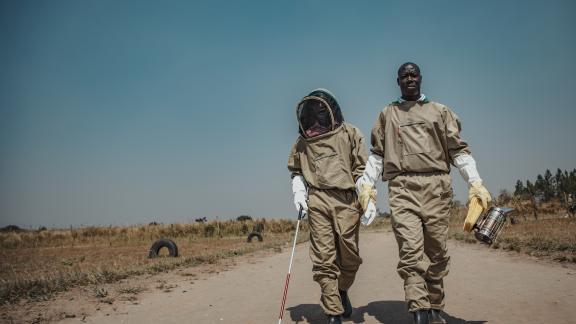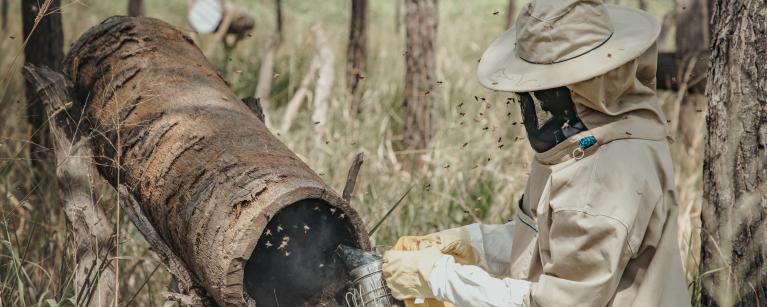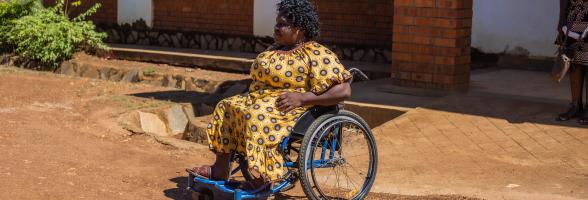After completing university in 2014, 32-year-old Francis Okello Oloya from Gulu district failed to secure employment. Francis notes that this was partly because he is visually impaired.
During this time after failing to secure a job, Francis learnt of an opportunity to participate in beekeeping and training from HIVE Uganda. He started with four local palm bee hives that he laid at his apiary.
“It was a very good start because I got training to become a master bee trainer which would help me train other blind people to participate in bee keeping.” He adds.
When the HIVE Uganda project ended, Oxfam through the Uganda National Apiculture Development Organization (TUNADO) came in and supported his bee-keeping project. He participated in the development of the manual for beekeeping for the blind in Acholi and in the audio translation to Acholi. He was also trained in good climate practices such as planting trees to conserve our environment.
Additionally, he was also trained in using a safer smoker to harvest honey as a way of conserving the environment. Francis was also taught on quality harvesting of honey to ensure value for money after harvesting. He also uses air-tight buckets to store his honey until it is ready for sale to the processors.
Francis is a now model bee farmer in his community, and more especially to the people with disabilities.
“I have 12 visually impaired persons in Paboo who come to my apiary to learn, and this has boosted our confidence because we are self-employed.” Beekeeping has become source of livelihood for him and other people living with disabilities. He has since multiplied the bee hives from four to 21 hives.
Beekeeping has given Francis a vision and a big goal for his community. He is the director and proprietor of Chance Nursery School – an early childhood development Centre in Palwong Parish.
“The bee-keeping project gave me the idea to start this school because I know soon, this apiary will be used as a learning center such that children not only know academics but can learn about agriculture at an early age. I want them to integrate farming with bee keeping. I also want them to learn how to conserve the environment,” Francis explains.
Francis notices that although bees may be dangerous, they can as well change a life when well managed. “I have self-worth and other people like me feel that way because our lives are better. It is for that reason that many more people with disabilities are joining beekeeping because they see me, and they get inspired''.
“The bee-keeping project gave me the idea to start this school because I know soon, this apiary will be used as a learning center such that children not only know academics but can learn about agriculture at an early age. I want them to integrate farming with bee keeping. I also want them to learn how to conserve the environment,” Francis Oloya, a bee farmer.”
MANAGING HIS APIARY
A person of visual impairment, Francis noted that he needs a guide who supports him to monitor his hives to manage pests and during harvesting.
“My guide helps me to open and harvest the honey when I am using a smoker, makes sure that the hives are cleaned well. He also helps me to sprinkle the bee wax inside to attract the bees when it comes to baiting the hive,” he adds.
Whenever he has no guide, Francis uses the white cane which helps him to check location, landmarks and tree stamps which most times alert him that he is at the apiary.
He added that TUNADO helped him with an innovation that aids him in locating his apiary.
“We use a navigation string so that we don’t lose the path to a beehive. This string has nods which helps us to identify the parts next to the beehive such that you prepare to approach the beehive. The first hive will be identified by a single nod, then the second hive will have two nods until the end. The bee hives are arranged in a semi-circle line such that you navigate easily.” Francis explains.

Oloya Francis with his guide heading to his apiary to harvest honey.

